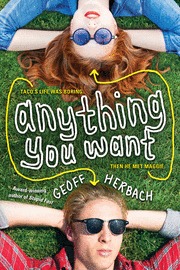
*This review will contain spoilers!*
'"Your hands are shaking, Wulliam."
Wull shrugged and shifted his grip on the mug.
"It's cold."
Pappa laughed, releasing a stinging breeze of lakoris tobacco.
"That's no' cold. Cold is when yer eyeballs scratch when ye blink, when it hurts to breathe. Ye'll be a Riverkeep soon. Ye'll get used to that quick enough."
"I'm no' Riverkeep yet," said Wull. Never, he thought.'
Wull's father is the Riverkeep, but on his sixteenth birthday he has to take the oars and become the Riverkeep himself. His birthday is still a few days away and he's certain he's going to be able to avoid his responsibilities somehow... Until his father gets dragged into the river by a bohdan, which possesses him and starts slowing killing him from the inside out.
Wull hears that the mythical beast the mormorach has resurfaced. Having researched the bohdan he knows that part of the mormorach can cure those who have been afflicted, so he puts his father in the bata - the Riverkeep's trusty boat - and sails down the Danek river towards Canna Bay, where the mormorach is rampaging.
Along the way, he acquires some companions. There's Mix, who was stowing away on a boat with some pirates and decides to stowaway on the bata instead. He also finds Tillinghast, a homunculus with a death wish, and Remedie, who's cradling a wooden baby called Bonn.
The ragtag group head along the river, getting up to all kinds of crazy antics on the way, but Wull's Pappa is still deteriorating. Will he be able to get to the mormorach in time?
Oh, if only there was something good to say. Everything about this was terrible.
I don't say that lightly. Normally I can find at least one positive aspect in any novel, but I'm actually scratching my head and feeling completely baffled about how this even got published (let alone why it's shortlisted for the YA Book Prize!).
Okay, I guess I liked the concept. I was expecting it to be more like Claire McFall's 'Ferryman' (a book I also hated, hmm...) as I'd assumed the Riverkeeps were pulling corpses out of the river to welcome them to the other side rather than just because there was an alarming amount of dead bodies in that stretch of water, but I guess someone has to do it!
I appreciated the fact that Wull was trying to save his father, rather than it being a parent attempting to save their child. It was nice to get that flipped on his head, and to see Wull attempting to fill his Pappa's boots as he unexpectedly became Riverkeep early. But Wull does a terrible job.
As you can tell by the fact that the gang get up to some crazy antics, the plot gets distracted regularly. There are needless diversions which just leave you groaning and wanting to tear your hair out. Till is infuriating, making everything harder, and if a characters only job is to interrupt the plot and make things harder it proves that the author doesn't know how to write decent obstacles.
Wull doesn't go through any real character development. He faces a bad guy, and the bad guy just happens to fall backwards, onto his own knife, killing himself in the process!
Of course! That's so feasible!
He faces the mormorach and the bohdan inhabiting his Pappa decides to switch into the mormorach, so he avoids certain death. Till also sacrifices himself to save Wull's life, despite the fact that they've nearly gotten each other killed multiple times because they're both so stupid.
I absolutely adored it when Wull was trying to save Till from certain death, and he said "He's a pain an' he's rude, but he's my friend". No, he's not. Every single thing that Till does is directly against Wull's wishes, they argue all of the time and they have nothing in common. That's not friendship.
Okay, I lied about Wull having no character development. He's hardly affected when his Pappa dies, which I guess is a huge metaphor for growing up and saying goodbye to things - like having your own dreams, and cherished family members.
Meanwhile Remedie, Bonn and Mix run into the night, never to be seen again. That's closure for ya. Mix only becomes relevant two sentences before she disappears for good, so I feel as though it's their adventure was written with an open ending to allow for a sequel, to which I say PLEASE GOD, NO.
I hadn't heard of 'Riverkeep' until it was featured on the YA Book Prize shortlist, and I knew after the first couple of pages that it wasn't the kind of book I'd normally read.
Reading this has proven how stubborn I am. I wanted to give up so many times, but I persisted and I can categorically say I haven't hated many books more than I hated this one.
I need to learn how to DNF.
Reading this has proven how stubborn I am. I wanted to give up so many times, but I persisted and I can categorically say I haven't hated many books more than I hated this one.
I need to learn how to DNF.
















